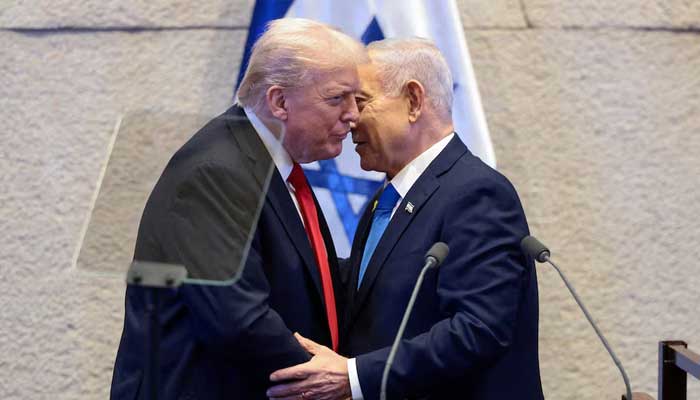Select Language:
President Donald Trump, who has styled himself as a peace broker aiming for a Nobel Prize, scored a diplomatic win Monday when global leaders gathered in Egypt to endorse the ceasefire and hostage exchange he facilitated between Israel and Hamas.
However, for true peace to endure, analysts and diplomats believe Trump must continue applying pressure on Benjamin Netanyahu, Israel’s Prime Minister, whose support will be crucial in subsequent negotiations.
Historically, U.S. presidents from Bill Clinton to Joe Biden have found Netanyahu challenging to collaborate with. Even officials within the Trump administration expressed frustration over certain Israeli military actions they viewed as counterproductive to U.S. policies.
This month, Trump managed to persuade Netanyahu to endorse a broader peace framework while also convincing other Middle Eastern nations to urge Hamas to free all Israeli captives, which is pivotal leverage in the conflict.
Nevertheless, the path forward may grow more complex. Disagreements remain between Israel and Hamas regarding many elements of Trump’s 20-point plan. As Israel gears up for elections next year, Netanyahu’s strategies may shift to keep his right-wing coalition intact.
“With an election cycle underway, Netanyahu’s decisions may pivot from capitulating to pressure to focus on his political survival,” noted Nimrod Goren, head of the Israeli foreign policy think tank Mitvim.
The strength of Trump’s peace approach also presents its weaknesses. The agreement’s core document leaves many specifics undefined, with neither side having committed to the finer details. This ambiguity was crucial in securing their signatures, but it signifies that critical diplomacy lies ahead.
One potential obstacle is the demand that Hamas disarm and have no role in Gaza’s future governance. While Hamas broadly agreed to Trump’s plan, their official response didn’t specify this condition, and Hamas leaders have indicated they envision a governing role in a post-war Gaza.
“There are numerous ways this could go awry,” warned Jon Alterman, a Middle East expert at the Center for Strategic and International Studies in Washington and a former State Department official.
“The agreement leaves much to be resolved later, which is unusual in international accords,” he added.
The Israeli embassy did not immediately respond to requests for comment.
A senior U.S. official mentioned that Trump’s influence over Netanyahu has been partly bolstered by his strong support for key Israeli priorities, including the formal recognition of Jerusalem as Israel’s capital and the annexation of the Golan Heights—long-standing goals of the Israeli government.
“President Trump hasn’t sought to be a neutral broker in Israel,” the official explained. “He’s backed Israel wholeheartedly, which has allowed him to steer them in the right direction.”
Trump’s track record with Netanyahu has been mixed regarding political pressure. In July, Israel bombed Syria’s defense ministry in Damascus, despite U.S. efforts to strengthen ties with the Syrian government. For months, Trump publicly supported Netanyahu amid mounting humanitarian concerns voiced by European and Arab allies.
More recently, Trump has adopted a tougher stance. He compelled Netanyahu, in a call to Qatar’s leader after a failed bombing in Qatar aimed at Hamas negotiators, and ultimately succeeded in securing Netanyahu’s endorsement of his peace plan despite Netanyahu’s misgivings.
According to Alterman, Trump’s current popularity in Israel gives him significant leverage over Netanyahu: “Trump is more popular among Israelis than Netanyahu himself, so he can influence Netanyahu’s political future—either supporting or undermining it.”
During a speech before Israel’s parliament Monday, Trump teased Netanyahu, saying, “Now you can be a little nicer because you’re not at war anymore,” drawing laughs and signaling a lack of particular deference to the Israeli leader.
Next year’s elections could still shift Netanyahu’s calculus. Supporters of right-wing figures like Itamar Ben-Gvir and Bezalel Smotrich might oppose halting military actions in Gaza, potentially forcing Netanyahu to abandon parts of Trump’s agreement.
Some analysts warn that delays by Hamas in disarming or fulfilling obligations could prompt right-wing factions to pressure Netanyahu into resuming military operations, undermining the peace deal.
“Given Hamas’s ongoing stance to retain power in Gaza, we’re concerned that partial commitments won’t be enough,” said Simcha Rothman, a member of Netanyahu’s coalition. “We’re not satisfied until Hamas fully surrenders. Anything less is unacceptable.”
Another sticking point involves language within the plan that leaves open the possibility of a future Palestinian state—something many Israelis may reject following Hamas’s October 7 attack.
Former U.S. ambassador Dan Shapiro noted that such opposition could dissuade Arab nations from pressing Hamas to meet its commitments under the agreement. “Including that in the plan was vital to garner Arab support,” he explained. “If Israel’s political discourse rejects the idea of a Palestinian state entirely, it could diminish Arab participation in the process.”







